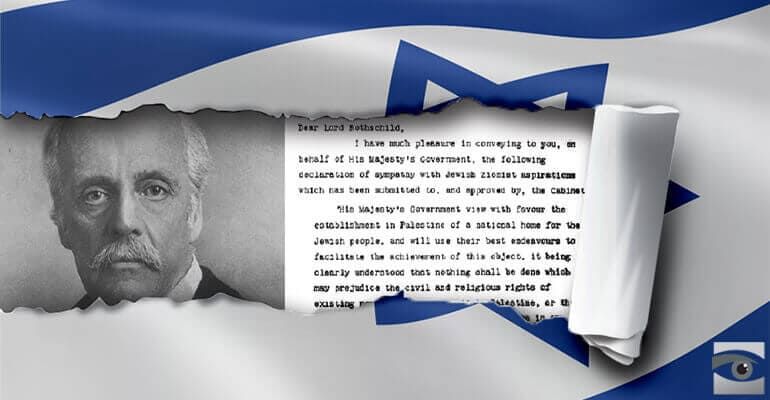In a commentary published in The Guardian, Avi Shlaim maintains that by recognizing Palestine, Britain can help right the wrongs of 1917’s Balfour Declaration. According to Shlaim, the theft of Palestinian land is a legacy of British colonialism. As such, the UK must do what it can to prevent Israeli annexation of parts of the West Bank.
Shlaim’s conclusion is based on a belief that the Balfour Declaration was the original sin in which Israel was conceived. The writer thus implies that this sin has been transmitted by heredity to every Jew who has ever lived in Israel to the present day:
The Balfour Declaration enabled the Zionist movement to embark on the systematic takeover of Palestine, a process the Zionists themselves initially described as settler colonialism, a process which is still continuing.
That’s strong stuff. But not even the intensity of Shlaim’s conviction can overcome some pesky facts about the Balfour Declaration.
Join the fight for Israel’s fair coverage in the news
Palestine 1917: Not a State in Sight
At the time that Arthur James Balfour issued his famous declaration in support of “a national home for the Jewish people” in Palestine, Shlaim asserts that Jews only comprised 10% of the population. The other 90% were Arabs. How could Britain have recognized the national rights of a tiny minority and denied it to the majority?
Shlaim gets it right. There were 600,000 Arabs and 60,000 Jews living in the region at the time. But what he neglects to mention is that there was no Arab state in the land at the time, nor was there any effort to establish one. In 1917, there was no national Palestinian identity – the non-Jewish residents of the land considered themselves to be part of the wider Arab nation.
Related Reading: ‘Historic Palestine’ – A Misleading Anachronism
Faiz El-Khouri, Minister of the Syrian Legation in Washington, in a speech he delivered to the United Nations General Assembly on May 14 1947 regarding the Palestine question, said:
I should like to explain to the General Assembly what the position of Syria is with respect to Palestine. I think most of you, if not all, know that Palestine used to be a Syrian province. Geographical, historical, racial and religious links exist there. There is no distinction whatever between the Palestinians and the Syrians and, had it not been for the Balfour Declaration and the terms of the mandate, Palestine would now be a Syrian province, as it used to be.
Shlaim also fails to note that the Jewish population residing in Mandatory Palestine had legitimate rights that predated the Balfour Declaration. Jews had an intimate historical, cultural and religious connection to the land for over 3,000 years. The term “Palestinian” was used for centuries to refer to Jews in Europe who were regarded as an alien presence, usually as a reference to their ancestral origins. And before the establishment of Israel, the meaning of the word Palestinian didn’t discriminate on ethnic grounds, but rather referred to anyone living in the region.
Yet Shlaim chooses to ignore Jewish indigenous rights in favor of the contemporary Palestinian narrative.
Related Reading: What Was the Land of Israel Like Before 1948?
Balfour Declaration? Nothing New Here
Shlaim presents the Balfour Declaration as a singularly strange piece of British statecraft:
Boris Johnson described the Balfour declaration as “bizarre”, “tragically incoherent” and “an exquisite piece of Foreign Office fudgerama” — a rare example of sound judgment and historical accuracy from the pen of Johnson.
A dose of historical context is in order. The breakup of the Ottoman Empire at the beginning of the 20th century led to the emergence of new independent countries throughout the region. After nearly four hundred years under Ottoman rule, “Mandatory Palestine” was established by the League Of Nations. The area was put under the control of Great Britain.

And the UK was a seasoned player on the world stage. It had already made several attempts during World War I to strengthen its grip on imperial territories by cutting deals with local religious and ethnic groups. This was when the sun never set on the British Empire. To maintain control over far-flung colonial possessions, Britain as a matter of policy capitalized on rivalries between tribes and ethnicities to divide on conquer. As with the long simmering Israel-Palestinian issue, Britain’s imperial legacy lingers on to a certain extent until the present day around the world.
Balfour Declaration: Guilty Of Stealing Palestinian Statehood?
If the Balfour Declaration was on trial, Shlaim’s primary charge would be that it has stifled Palestinian national aspirations.:
In 2017, [Boris]Johnson, then foreign secretary, rejected Labor’s call for the UK to mark the Balfour declaration’s centenary by officially recognizing the state of Palestine, declaring that “the moment is not yet right to play that card”. Surely today the moment has come.
But anyone expecting a smoking gun will be disappointed. For all its historical importance, the 67-word declaration is a remarkably vague document. It mentions support for the creation of a Jewish homeland, not a state. Also, Balfour gave no further instructions or timeline for establishing this homeland. In short, the declaration’s value was largely symbolic.
For some, the Balfour Declaration was but one step on the way to the fulfillment of the program of restoring Jewish sovereignty in the Jewish people’s ancient homeland. Meanwhile, Palestinian Authority President Mahmoud Abbas claims that the Balfour Declaration:
…promised a land that was not his to promise, disregarding the political rights of those who already lived there. For the Palestinian people – my people – the events this letter triggered have been as devastating as they have been far-reaching.
It’s interesting to note the absence of any daylight between the Palestinian leader’s opinion and Shlaim’s. When it comes to the legacy of the Balfour Declaration, it’s vagueness opens up the document to many interpretations. And Shlaim is entitled to believe that:
Recognizing Palestine as a state within the 1967 borders is another way for Britain to right the wrongs of Balfour and end up on the right side of history.
But when it comes to sticking to the facts, Shlaim’s piece is riddled with so many misstatements and omissions that his trial of the Balfour Declaration would be thrown out for lack of evidence.
Enjoyed reading this article? Follow the HonestReporting page on Facebook to read more articles debunking news bias and smears, as well as others explaining Israel’s history, politics, and international affairs. Click here to learn more!
Featured Image: poster of Palestine/Erez Israel via Wikimedia Commons.


